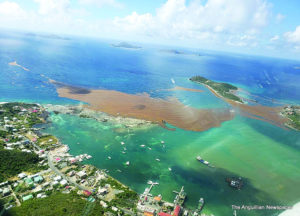 The United Kingdom (UK) Government-funded Darwin Initiative recently awarded a £228,595 grant for the project ‘Sustainable Sargassum Management in Anguilla, British Virgin Islands and Montserrat’. The two-and-a-half-year project, which officially started in October 2021, received funding from the Darwin Plus scheme which provides grants to projects that aim to protect the unique biodiversity and improve resilience to climate change within the UK Overseas Territories.
The United Kingdom (UK) Government-funded Darwin Initiative recently awarded a £228,595 grant for the project ‘Sustainable Sargassum Management in Anguilla, British Virgin Islands and Montserrat’. The two-and-a-half-year project, which officially started in October 2021, received funding from the Darwin Plus scheme which provides grants to projects that aim to protect the unique biodiversity and improve resilience to climate change within the UK Overseas Territories.
Severe sargassum influxes have become a recurrent event in the Eastern Caribbean, including in Anguilla, British Virgin Islands and Montserrat. Influxes have resulted in adverse impacts, including biodiversity loss in coastal and marine ecosystems, health impacts on local communities, and socio-economic and livelihood impacts in the tourism, fisheries and marine transport sectors. Impacts are directly felt in these sectors, including by fisherfolk, dive and tour operators and other community micro-enterprises, as well as by all coastal users which, for these tiny islands, comprise their entire populations.Research by the Centre for Resource Management and Environmental Studies of the University of the West Indies (UWI-CERMES) and the United Nations Environment Programme – Caribbean Environment Programme (UNEP-CEP) highlights that management of sargassum influxes is hampered by: (1) inadequate local and scientific information on lessons and best practices for management and adaptation; (2) poor forecasting and inadequate preparation; (3) lack of guiding national policies or plans and poor coordination for effective responses; and (4) inadequate access to funding to implement management and adaptation solutions.
The main aim of the ‘Sustainable Sargassum Management in Anguilla, British Virgin Islands and Montserrat’ project is therefore to enhance the institutional frameworks and knowledge, experience and commitment of coastal and marine resource managers and users in Anguilla, British Virgin Islands and Montserrat to manage the ecological and socio-economic risks from sargassum influxes. The project will use a participatory approach to document local and scientific information to inform management best practices and decision-making. Capacity building will also be a strong feature of the project, including training partner agencies, civil society organisations and local communities to use drone technology to monitor sargassum influxes. At the policy level, the project will also seek to collaboratively develop and implement sargassum management plans in each of the targeted Territories.
The project will be implemented by the Caribbean Natural Resources Institute (CANARI) in partnership with the Department of Natural Resources – Anguilla; Ministry of Natural Resources, Labour and Immigration – British Virgin Islands; Department of Environment – Montserrat; UWI-CERMES and the Organisation of Eastern Caribbean States (OECS) Commission.
A virtual launch for the project was held on December 1, 2021.
To learn more about the ‘Sustainable Sargassum Management in Anguilla, British Virgin Islands and Montserrat’ project visit https://canari.org/darwin-sargassum-ots/.
– Press Release








